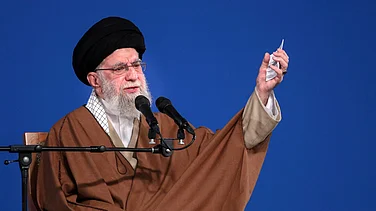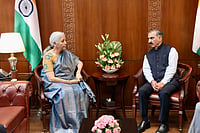A historical Hindu temple near the Pakistan-Afghanistan border has been demolished and construction for a commercial complex has started at the site in the Khyber Pakhtunkhwa province that was closed since 1947 when the original occupants migrated to India.
The 'Khyber Temple' was situated in the border town of Landi Kotal Bazaar in the Khyber district but had been vanishing brick by brick over the years. The construction at the site started about 10-15 days ago.
Officials from various administrative departments either denied they were aware of the existence of the Hindu temple or claimed the construction was happening according to the rules.
Claiming that there was a historical temple in the main Landi Kotal Bazaar, leading tribal journalist Ibrahim Shinwari, hailing from Landi Kotal, said: “The temple was located in the centre of the Landi Kotal bazaar, which was closed in 1947 after the local Hindu families migrated to India. It was partially damaged by some clerics and seminarians in 1992 following the demolition of the Babri Masjid at Ayodhya in India.”
Recalling that as a child, he heard many stories about the temple from his forefathers, the journalist said, “There is no doubt in it that there was a temple named 'Khyber Temple' in Landi Kotal.”
Haroon Sarabdiyal of the Pakistan Hindu Mandir Management Committee insisted that it was the responsibility of the district administration and relevant government departments to ensure the protection and rehabilitation of historical buildings of religious importance to non-Muslims.
“The archaeology and museums department, police, culture department, and local government were bound by the 2016 antiquity law to protect such sites, including places of worship,” he said.
The Dawn newspaper quoted Assistant Commissioner Landi Kotal, Muhammad Irshad, who expressed ignorance about the temple’s demolition and said, there is no mention of the temple in the official land record of Khyber tribal district.
“The entire land in Landi Kotal Bazaar was owned by the state,” he said.
The official maintained that a ‘no objection certificate’ has been issued to the builder for the renovation and repair of some old shops in Landi Kotal Bazaar.
The tehsil municipal authorities have granted permission for the commercial buildings or shops at all commercial and trade centres in tribal districts.
Tehsil Municipal Officer (TMO) Shahbaz Khan said that the local government was authorised to give the go-ahead signal for the construction of all commercial structures in the area only after their maps or drawings were approved and the requisite fees were deposited.
The Municipal authorities admit that they do not have authentic and organised revenue records in Khyber district.
Abdus Samad, the former TMO during whose tenure the deal for the construction of a commercial building was struck, expressed complete ignorance about any such orders issued by his office.
Landi Kotal patwari Jamal Afridi claimed he was not aware of the construction activity at the temple’s site. He added that the revenue records had no mention of a mandir at that site.
If the government fails to fulfil its obligations towards religious minorities, all their places of worship and other historical buildings will vanish soon, he said.
Shinwari questioned the claims of the district administration at Khyber and the municipal authorities having no official land record of the temple.
“It is the responsibility of the auqaf department to maintain and preserve historical non-Muslim places of worship, but the department had no office or employees in the Khyber tribal district,” Shinwari said and added, “Many aged tribal elders would bear testimony to this fact that there was a temple in main Landi Kotal Bazaar.”
Sarabdiyal suggested that the places, which were either not used by minorities or in a dilapidated condition, could be utilised for any social welfare activity to the collective benefit of the local communities rather than demolishing it and constructing something new.


























